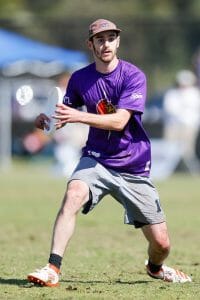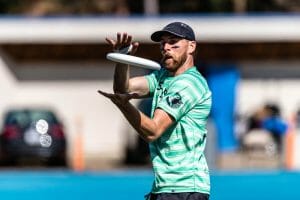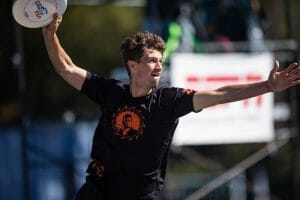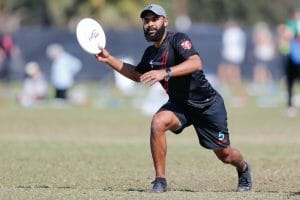Our selections for the seven best performers of the year.
November 23, 2021 by Ultiworld in Awards with 0 comments
Ultiworld’s 2021 Men’s Club Awards are presented by Five Ultimate; all opinions are those of the authors. Please support the brands that make Ultiworld possible and shop at Five Ultimate!
Ultiworld is pleased to announce our annual Men’s Club Awards. While we consider both regular season and postseason performance, because of the nature of the Club Division, we weight success in the Series and at Nationals above all else — this year even more so than most. The All-Club Awards are selected based on input from Ultiworld reporters, contributors, and editors.
Player of the Year Award
Offensive Player of the Year Award
Defensive Player of the Year Award
Breakout Player of the Year Award
Coach of the Year Award
All-Club First Team
All-Club Second Team
Club Awards Voting Breakdown
2021 Men’s All-Club First Team
Chris Kocher (New York PoNY)

Efficiency is a word that can often get overused in ultimate, but not in the case of Chris Kocher. Whether it’s his excellence with the disc in hand, or uncanny ability to move just as necessary to steal a block or save a sideline-bound throw, Kocher is efficient. He has never given less than his utmost for New York PoNY, while wasting almost none of that effort. In 2021, this translated to an output that included being the team’s top goal scorer for the season overall, and trailing only some guy named Jimmy Mickle in assists. No one can deny his effort and what it brought forth in PoNY this season, a finals berth and a WUCC qualification, where Kocher will have a chance to get another shot at the gold medal there.
What’s particularly impressive about Kocher this season is how he made difficult tasks look easy. Take another look when you can at his over-the-shoulder block on Eric Taylor in the final. Taylor was keeping his body in front, had a better angle on the disc, and still Kocher found the block an instant before it was too late. It’s easy to remember a big-stage moment like this, but Kocher has plays like these in spades all season. Time and again, Kocher has shown that a team is better with him on it, the same can be said for our All-Club list.
–Graham Gerhart
Raphy Hayes (Portland Rhino Slam!)

The impressive recent Nationals runs of Portland Rhino Slam! have been intertwined with the blossoming of Raphy Hayes’ electrifying game. A flying downfield dynamo, Hayes’ high-hopping skies and sprawling bids make him a magnet for the highlight cameras and easy for fans to attach to.
But make no mistake, there’s more than enough substance to fuel the flash. He’s been a triple threat, piling up goals, assists, and blocks, to the point of tying to lead the division at Nationals this year, doubling his goal total from 2019 while anchoring Rhino’s best results to date. In Rhino’s bracket games — two clutch wins before an embarrassing blowout loss — he turned in eight goals, five assists, and four blocks across three matches. While that final round was not his finest performance, he never shrank from the moment, including in those very tight prequarter and quarterfinal matches. He’s one of the division’s highest usage initiation cutters who doubles as a punishing deep threat, making him one of the toughest 1-on-1 covers in the game.
-Keith Raynor
John Stubbs (Atlanta Chain Lightning)

The sibling rivalry within the Stubbs household must be a never-ending (though exceedingly polite) procession of increasingly impressive one-upmanship, but the youngest entrant can now lay claim to an achievement neither George nor India ever could: a spot on a club POTY podium. Doing so while leading hometown club Atlanta Chain Lightning to one of their best seasons in a decade likely makes it all the sweeter.
With Chain still working their way back into national relevance, John Stubbs was precisely the piece they required to raise their ceiling. A top-tier contributor in every facet of the game, the Harvard man is not simply the right tool to mend a single broken issue, but an entire tool chest in one, capable of tightening, relieving, fortifying, and tweaking to improve each component part of the team’s system. His handiwork this year had Atlanta back amongst the division’s elite and with a little more tinkering in the years to come, is likely to improve Chain before we get a look at the finished product. John Stubbs already is.
–Steve Sullivan
Matt Rehder (Seattle Sockeye)

There is a casual grace to Matt Rehder’s game that makes what he does on the field look almost easy. Of course, if it was easy to put up 21 goals and 17 assists across Nationals and Pro Champs, everyone would do it.
The thunderclap power of Rehder’s on-field abilities disguise themselves in the smooth way he moves around the field, pushing defenders into the deep space then somehow being five yards open for a big under, or hanging out around the disc, turning upfield, and somehow being wide open for a 50-yard huck. Like a sports car that runs with such polish at high speed you don’t even realize you’re going 120 until you look at the dash, Rehder belies the force of nature impact he has on the game until you check the stat sheet.
This characteristic means you won’t see a lot of Rehder’s production end up on a highlight reel. It will however be plenty apparent in Seattle Sockeye’s win column.
–Patrick Stegemoeller
Jack Williams (Raleigh Ring or Fire)

It’s hard to stand out on a team like Raleigh Ring of Fire. Between the deep sense of mutual support, the reality of sharing talents with a cadre of other players who have been raised on the same core skills, and the tactical advantage of wide offensive distribution, no one on Ring really makes that much of a distinct impression. They were the consummate team in 2021, and it probably cost them a measure of individual recognition, even as it won them a championship.1
Except that Jack Williams does stand out. He always stands out. He doesn’t even have to do much in a given moment: just his presence on the field — the dread of knowing that he can outrun, outjump, and outsmart your best defender the moment it occurs to him to do so — bends outcomes in his favor. It’s a problem of energy, kinetic and potential. He’s unstoppable when he’s in motion, and when he’s at rest it’s as if he’s full of future unstoppable motion.
Jack is an all-trades kind of player: he runs the weave with Sol Yanuck and Matt Gouchoe-Hanas, trades initiation cuts with Ryan Osgar and Anders Juengst, blasts deep when Henry Fisher or Terrence Mitchell clear a space for him, crosses over to the defense to spell Eric Taylor and Jacob Fairfax against the other team’s first option. Fittingly, he played the most points (14) for Ring in the final, including the make-it-look-easy glide beyond the deep defenders to bring in the title-winning score: vintage Jack Williams excellence to cap off another stellar season.
–Edward Stephens
Johnny Bansfield (Chicago Machine)

The long pandemic hiatus might have helped usher in a changing-of-the-guard at the top of the men’s division, but it didn’t do anything to dim Johnny Bansfield’s star. The two-way star followed up an All-Club 2nd Team 2019 with a campaign that saw him do nothing but burnish his awesome reputation.
With Bansfield, it’s all about the twin virtues of comfort and discomfort. Discomfort, of course, is his specialty on defense. At once one of the of the most athletic and least predictable defenders in the game, the disruption his presence causes in Chicago Machine’s fluid zone is exceeded only by the havoc he can wreak with a simple sideline mark. Don’t take my word for it; ask Adam Rees, who found out the hard way on universe point in prequarters at Nationals that Bansfield has an eagle-eye for layout handblock opportunities.
The highlight defense is old-hat for Bansfield. Where he truly exceeded himself this season was after the turnover. Everyone already knew he could shoot with the best of them, but this season he added a dimension of delicacy. Without Kurt Gibson in the 2021 mix, Machine’s D-line offense belonged to Bansfield. As the point position of a break-swing-reset offense, he was as composed as position standouts Sol Yanuck and Jimmy Mickle: there just wasn’t a mark who ever seemed to give him any trouble.
–Edward Stephens
Sol Yanuck (Raleigh Ring of Fire)

The watchword for the Ring of Fire offense in 2021 was variety. With such a diversity of attack points in play, defensive gameplans against them were pretty much guesswork. For all of that unpredictability, however, there was a guarantee: the disc went through Sol Yanuck first.
A nimble reset, thoughtful distributor, and (whenever he was feeling his oats) daring shot-taker, Yanuck played the pressure-laden center handler role with all the commingled grace and precocity of a brash young symphony conductor. He held the baton for the gorgeous orchestral offensive sequences that overwhelmed Ring’s pool opponents, flustered Chain and Rhino in the bracket, and flew beyond even the PoNY D-line’s extensive reach in the final.
Yanuck’s 14 assists at Nationals, including three in the final, were tops on Ring. That undersells his impact though, because you could argue that as the O-line’s prime mover he had at least a share in every goal that formidable unit scored.
–Edward Stephens
Something tells me they’ll take that trade any day of the week, though. ↩